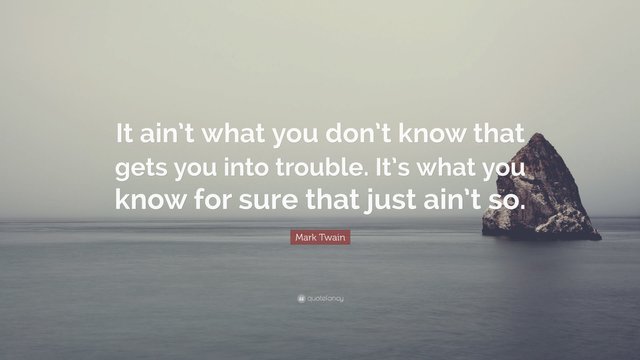The Timeliness Of Edge – Defining the Retail Investor's Primary Advantage
We hear it referred to so often in the investment world, in the world of sports, and more broadly, in anything that is competitive, has sums of money on the line, and requires high performance in order to be deemed successful.
What is your edge?
Edge is what everyone strives for when it comes to investment. Entire portfolio theories are based upon the team having an edge in some domain of knowledge.
This is the exact role that hedge funds play in the ecosystem. They specialize in some domain of knowledge and they receive funds from larger funds looking to diversify and gain exposure to areas of the market where they do not have the necessary resources to be competitive. Hedge funds are just outsourced investment capabilities for larger funds to tap into when deemed appropriate, or equally as likely, when pitched properly.
Speaking of pitches, in today’s environment of cheap credit via low interest rates, meaning low risk of looking like an idiot, hedge fund pitches are predicated and evaluated almost exclusively upon how convincing and dynamic the definition of their edge is.
How unique is said hedge fund's edge with regards to talent, R&D, network reach, location, reputation, political connections, AUM, et cetera?
After all, what other metric besides edge – however arbitrary and intangible a measure it may be – can be used to reasonably estimate the competence of a hedge fund pitching itself as an expert in some domain? You can't. Position size accordingly.
The thing is that one's perceived edge may not be an edge at all, especially when the person telling you he/she is an expert in some domain of knowledge is in fact a novice, at best.

It’s not the things that you know, it’s the things you know that just aren’t so.
In short, that’s my approach to risk. More often than not, it's also how I tend to determine how much salt I must lend to someone's explanation that they've found their edge based on some arbitrary (often impressive sounding) measure. The more impressive it sounds, the more salt I toss into the mix.

Some of the more conventional definitions of edge can be summed up as:
"We team up with geniuses [fill in the blank]"
- in the physical sciences
- in mathematics
- in computer science
- in health and nutrition
- in space technologies
- in oil and gas exploration
Ad infinitum
Make no mistake, while there are a number of unqualified hedge funds opening each year, the market has its way of weeding out those who are incompetent. Those who may have a gift when it comes to giving pitches, garnering assets under management, and convincing others that they possess an edge must then perform as advertised.
Otherwise, their investors will begin to doubt how realistic their edge really is and will liquidate their holdings. As we've witnessed over the past few years, there is plenty of doubt to go around within the hedge fund community.
What, then, is a realistic edge that any retail investor can work towards developing?
Especially when one takes into consideration that there is likely a very competent opponent in the form of a hedge fund (or seven) operating in the exact same domain with much more sophistication and resources, how can the average Joe get some sleep at night?
Patience. Willpower. Staying power. Liquidity. Conviction.
Essentially, the ability to put on a position and then patiently wait for the market to express a similar opinion is a retail investor's most potent weapon.
It’s showing up early to the party and then awaiting the rest of the guests to show up and pay a more expensive cover than you did getting in for cheap during happy hour. While we have the ability to simply show up and stay, our professional counterparts must continually provide updates to their clients, and more often than not, this requires that they leave the party before it's even begun.
Look no further than the successes of Warren Buffet and Charlie Munger. Their investment strategy is to acquire companies at a discounted valuation, and then hold them forever.
What does forever mean, again? Does that mean 5 years, 10 years, 20, or even 40?
No. They are the epitome of buy and hold. They acquire for cheap and then hold forever.
Of course, Buffett and Munger are investing with hundreds of billions of dollars at their disposal, so the mechanics of their portfolio are different than ours.
However, there’s a lesson to take from these men and that is patience is the most undervalued principle of all.
As relatively unsophisticated retail investors, our edge comes in our ability to hold onto our convictions without having to answer to any clientele on a quarterly basis. We are the judge, jury, and executioner when it comes to our own portfolio.
We can express opinions, and then walk away from them to research other areas of knowledge that we may arbitrage. In the meantime, we allow our expressions the most valuable commodity of all to play out: time.
I find that in today’s hyper connected world, nearly every investment strategy is built around minimizing the time required in order to realize the maximum gain. Especially when you begin delving into the world of high frequency trading strategies that are made increasingly powerful via machine learning algorithms and the largest data sets known to mankind.
So, as the word sophistication increasingly comes to be associated with a reduction in time, I find the inverse to be equally as true. Longer timelines may not show the fruits of the labor as quickly as their shorter-term counterparts, but they do remove a large portion of risk and uncertainty while also removing a whole hell of competitors from the playing field that we likely do not wish to compete with in their game.
In the end, while most complain that retail, non-accredited investors are dealt a major disadvantage when entering the gladiator ring that is commonly referred to as markets, I find the inverse to be true. Our lack of sophistication, resources, insider knowledge, expert advisers, and armies of software engineers allows us to reduce the equation down to the fundamentals.
The only edge we can have is investing based on timelines that are longer than those of all of our competing gladiators.
It’s not based upon physical strength, intelligence, connections, nor resources. Assuming you’ve properly done your homework and no substantial changes to your thesis become apparent, then putting on a position and then forgetting you’ve done so, only to check back in 5-10 years is an act of prudence.
Why?
Because that is the hardest thing to do. Oftentimes, the things we find the most difficult are the things we ought to be doing. And while it is healthy to acknowledge how outgunned we retail investors are in today’s marketplace, would you rather complain about it or find your niche and maximize the likelihood that you profit from this edge?
My focus is on the latter, and it’s an iterative process. While every mechanism about the market changes incessantly over time, the one constant is human nature. More specifically, how human nature tends to undervalue the power of time. Buffet often alludes to this via his emphasis on the circle of competence:
"I stay within that circle and I don't worry about things that are outside that circle. Defining what your game is, where you're going to have an edge, is enormously important."
Find assets that are undervalued relative to others. As we’ve witnessed lately, currencies are fluctuating, as are interest rates, as are political regimes, as are national and global zeitgeists. Taking these into account, it appears an appetizing time and place to play a game where you express an out-of-favor opinion, buckle in for the long haul, and then observe people and events with a sense of humor.
"Patience is not the ability to wait but the ability to keep a good attitude while waiting."
– Joyce Meyer
DISCLAIMER : This content is for informational, educational and research purposes only. This post is not to be taken as personalized investment advice.
Congratulations @maven360! You received a personal award!
You can view your badges on your Steem Board and compare to others on the Steem Ranking
Vote for @Steemitboard as a witness to get one more award and increased upvotes!